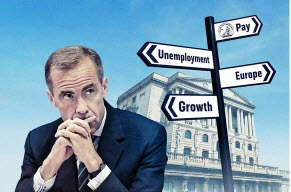So the Fed has hiked while the BOE remains cautious. What's the difference between them?
Before you ask, I'm not getting the bunting out just because retail sales surprisingly jumped 1.7%. They could just as easily fold this month if everyone's spent all their shillings in Nov and are now skint. The question is whether the Fed is justified in raising rates and the BOE in not raising?
The Fed has hiked in what they see as a solid economy. It's still got work to do, and there's still headwinds but lets compare the UK and US on 3 main indicators
Retails sales
Might as well start here

UK/US retail sales y/y
If the consumer is an important gauge then the current trend for both is clear. The UK is showing a far stronger consumer than the US. That's a big factor deciding whether your citizens can wear a hike. Although on paper the US looks weaker, one big factor in the falling spend is that more are saving and paying off debt, which in itself is good news as it means there's spare cash in pockets to do so.
Inflation
Running at 0.5% y/y in the US and 0.1% in the UK. Both are nowhere near target. On the core, the US pulls ahead

UK/US core CPI y/y
Jobs market
Both are running a strong jobs market. Both are seeing unemployment continually falling

UK/US unemployment rate
The Fed run looks stronger coming off of a higher level but both are at the lowest since before crisis
On the earnings front we're both neck and neck

UK/US earnings
Ok, there may be a bit of apple and orange comparing with US hourly vs UK weekly and the 3m rolling but the overall picture speaks well enough.
While the UK has shown strong wage gains over the last 18 months, they've been more volatile and come off much lower levels, something the 3m gauge should smooth out. The US has been my usual keyword, "steady". For the Fed that's good enough to say that wages are ticking along and they are happy with that trend. For the BOE, despite the recent growth, a more sustained trend would be preferable
Conclusion
On the face of it the Fed can feel justified that the economy is moving along. There's no real volatility in the numbers and that's one weight off their shoulders. The US economy is like a plane. It's taken of and has now reached its cruising altitude and is levelling off. The economy may not be at 35,000 feet but it's in the air and fairly clear of mountains
The UK economy has taken off, and probably at a sharper rate initially than the US, but the BOE probably still feel the plane is still trying to gain more altitude, and is hitting the odd bit of turbulence on the way. The time they will start thinking of hikes is when things level out and move into steady mode. We're probably not too far off. A few more months of solid wage gains, some turn up in inflation (core or otherwise), continuing robust consumer, and more of that slack being taken up and we might start hearing some hawkish chatter
I said that this year both the BOE and Fed would raise rates. I was 50% right and still think the BOE were in the race this year. Now that I've put these main indicators together I can see what the UK needs to do to push the MPC votes across. I still maintain that the expectations have been pushed too far out into 2016/17. Q1 2016 will be very important, as most first quarters are. A strong one and some of those expectations will be reeled back in. If I had to stick my neck out I'd say that if all goes well, the BOE will look to go around Q2 next year. If Q1 starts well then that would be the time to start seeing whether some of the votes change too. I feel the MPC will use the votes to get the hike message across, changing by no more than one a meeting in the run up to a hike
The BOE will also be very interested in how the hike goes down in the US and whether it has any material effect on the economy. They'll take some time to watch that. We've also got to remember that the UK rate is 0.5% so is not fully on the floor like the Fed and ECB, and that gives them a bit of wiggle room
Over to you Mr Carney

Lots to think about in 2016 MR C